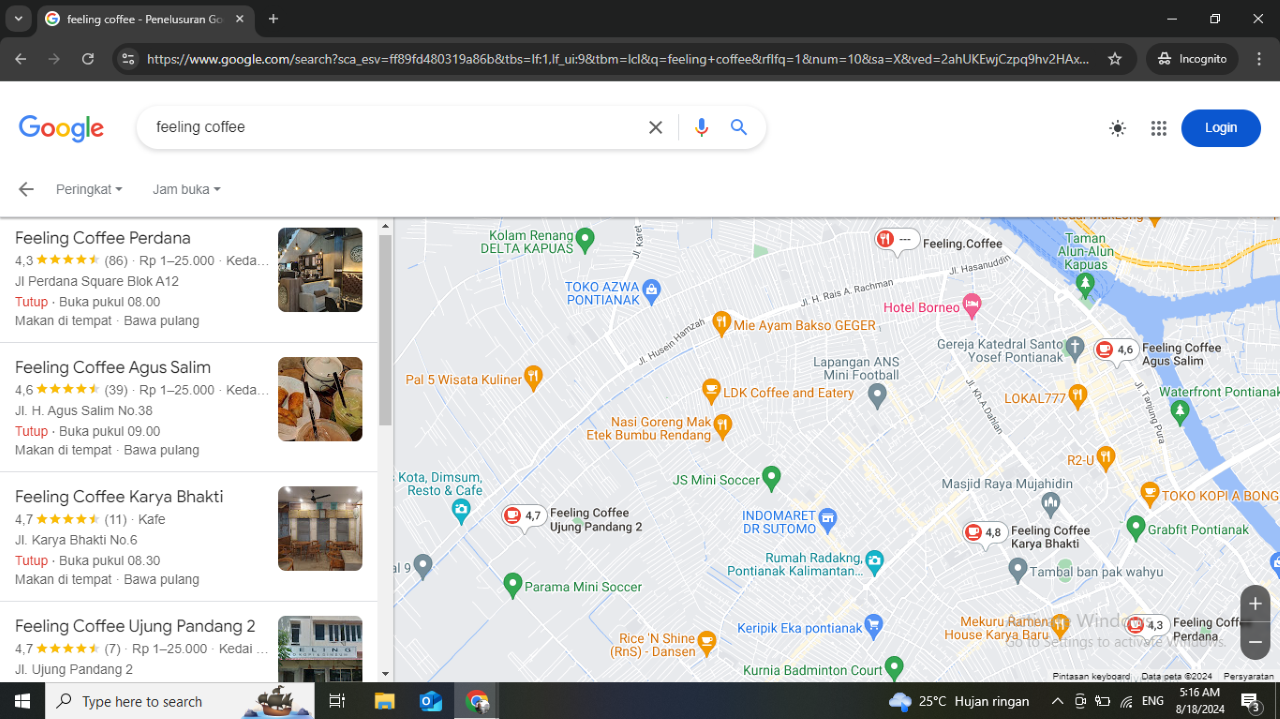Local SEO Optimization
This is where the importance of local SEO optimization comes into play. Local SEO is a subset of search engine optimization. This focuses on optimizing a business’s online presence to attract local customers.
It involves strategies and techniques aimed at improving a business’s visibility in local search results. Especially when users are searching for products or services within a specific geographic area.
What are The Key Concepts in Local SEO Optimization
Local Pack
The local pack refers to the section in search results that displays local business listings. It typically appears as a map with three prominent listings and provides essential information such as business name, address, phone number, and reviews.
Google My Business (GMB)
GMB is a free tool provided by Google. This allows businesses to manage and track their online presence. It includes the business’s listing on Google Maps, customer reviews, images, contact information, and other details.
NAP Consistency
NAP stands for Name, Address, and Phone number. NAP consistency refers to ensuring that this information is consistent across all online platforms. This includes the business’s website, directory listings, and social media profiles.
Factors Influencing Local SEO Rankings
Several factors influence a business’s rankings in local search results. Understanding these factors is crucial for effective local SEO optimization. Some key factors include:
Relevance
The relevance of a business to a particular search query plays a significant role. Businesses need to ensure their website and content align with the search intent and keywords used by local customers.
Proximity
The proximity of the business’s physical location to the user searching for local results is another important factor. Search engines strive to provide users with results that are geographically close to them.
Reviews and Ratings
Online reviews and ratings contribute to a business’s credibility and trustworthiness. Positive reviews can improve a business’s visibility and attract more customers. While negative reviews may have the opposite effect.
What are The Key Strategies for Local SEO Optimization
Keyword Research for Local SEO
Effective keyword research is essential for local SEO optimization. Here are some strategies to consider:
Location-based Keywords
Identify location-specific keywords that your target audience may use when searching for local businesses. Include city names, neighborhoods, landmarks, and other relevant geographical terms in your keyword research.
Long-Tail Keywords
Long-tail keywords are longer and specific phrases. These typically have lower search volume but higher intent. Focus on long-tail keywords that incorporate location and specific services or products to target potential customers with higher precision.
Competitor Analysis
Analyze the keywords that your local competitors are targeting. This can provide insights into effective keywords and help you identify opportunities to differentiate your business.
Optimizing Website for Local Search
To optimize your website for local search, consider the following strategies:
On-Page Optimization
Optimize your website’s meta tags, titles, headers, and content. Don’t forget to include relevant local keywords. Ensure that your website provides valuable, location-specific information to visitors.
Location Landing Pages
Create dedicated landing pages on your website that target specific locations you serve. Include localized content, testimonials, and case studies to enhance relevance.
Mobile Optimization
With the rise in mobile searches, ensure that your website is mobile-friendly and responsive.
Create GMB Listing
Follow these steps to create and optimize your GMB listing:
Claim and Verify
Claim your GMB listing and go through the verification process to establish ownership and gain access to management features.
Complete Business Information
Provide accurate and detailed information, including business name, address, phone number (NAP), website URL, business hours, and categories. Ensure they are consistent across all platforms.
Compelling Description
Craft an engaging and informative business description that highlights your unique selling points and local relevance.
Build Local Citations with NAP Consistency
Building local citations and maintaining NAP consistency is vital for local SEO optimization success. Consider the following strategies:
Directory Listings
Submit your business information to reputable online directories, industry-specific directories, and local directories. Ensure that your NAP details are consistent across all listings.
Local Business Data Platforms
Utilize platforms like Yelp, Yellow Pages, and Bing Places for Business to create and optimize your business profiles. Complete each profile with accurate NAP information and compelling descriptions.
Obtain Online Reviews and Ratings
Online reviews and ratings play a significant role in local SEO optimization. Encourage your satisfied customers to leave reviews and ratings by implementing the following strategies:
Claim Review Profiles
Claim your business profiles on popular review sites such as Google, Yelp, TripAdvisor, and industry-specific platforms.
Reach Out
Reach out to happy customers and kindly request their feedback and reviews.
Monitor and Respond
Regularly monitor your reviews. Also, make sure you quickly respond to both positive and negative feedback. Show your appreciation to positive reviewers and address concerns raised in negative reviews professionally.
Why Hire Professional SEO Services
Well, you might try to do it all by yourself. But you may find some complications and hiccups in the process. So that is where SEO experts come into play.
They take out all the guesswork and offer a complete do-it-for-you service. Hence, outsourcing SEO services for local optimization offers several advantages, like
Expertise and Experience
Professional SEO agencies specialize in optimizing websites for local search. Especially agencies like Gigle Global Solutions, who are experts in the industry.
They have in-depth knowledge of the latest industry trends, algorithms, and best practices. By outsourcing, businesses can tap into this expertise and benefit from the agency’s experience in driving local SEO success.
Time-Saving
Local SEO requires continuous effort and dedicated resources. By outsourcing to an SEO agency, businesses can save time.
And then use this saved time to allocate their internal resources more efficiently. While focusing on core business operations while leaving the SEO tasks to the experts.
Simple Approach
SEO agencies like Gigde global solutions provide a simple approach to local SEO optimization. They analyze the business’s current online presence and conduct thorough keyword research.
They optimize website content and structure, build citations, manage online reviews, and monitor performance. This comprehensive approach ensures that all aspects of local SEO are covered.
Choosing The Right SEO Agency
Now as you decided to work with SEO experts, it’s important to determine whom to work with. When selecting an SEO agency for local SEO optimization, there are several factors:
Experience and Track Record
Assess the agency’s experience in local SEO and its track record of delivering successful results for clients. Request case studies or references to validate their expertise. A good example of this would be Gigde Global Solutions.
Local SEO Expertise
Ensure that the agency has specific expertise in local SEO optimization. Inquire about their strategies for optimizing Google My Business listings. While also building local citations, managing reviews, and targeting location-specific keywords.
Transparency
Look for an agency that values transparent communication. They should be willing to provide regular updates, reports, and insights on the progress of your local SEO campaign.
How to Measure and Track the Performance
You can start performance tracking with the basics like key metrics. There are several Key Metrics that you can use to track your local SEO Success. They are:
Local Rankings
Monitor your website’s rankings for targeted keywords in local search results.
Organic Traffic
Analyze the organic traffic to your website, specifically from location-based searches.
Google My Business Insights
Utilize the insights provided by Google My Business to understand how users are interacting with your listing.
Online Reviews and Ratings
Monitor the number and sentiment of online reviews and ratings.
Utilizing Google Analytics Tools
Google Analytics and Google Search Console are valuable tools for tracking local SEO performance. Use them to gain insights into:
Website Traffic
Analyze the organic traffic to your website, including the sources, geographic location of visitors, and user behavior on your site.
Search Queries
Review the search queries that drive traffic to your website. Identify the keywords and phrases that are generating the most visits from local searchers.
Click-Through Rates (CTR)
Evaluate the CTR for your website in local search results. This metric helps determine the effectiveness of your meta tags, title tags, and meta descriptions in attracting clicks from local searchers.
Indexing and Crawling Issues
Use Google Search Console to identify any indexing or crawling issues that may impact your website’s visibility in local search results.
Conclusion
In today’s digital landscape, local SEO plays a vital role in helping small businesses thrive in their local markets. By focusing on local search visibility and tailoring their strategies.
Especially, to target specific geographic areas. By implementing this, businesses can effectively reach their local audience and drive valuable organic traffic to their websites.
Throughout this article, we have explored various strategies and best practices for local SEO optimization. Including keyword research and key strategies to optimize websites for local SEO.
In conclusion, It is crucial for businesses to recognize the importance of local SEO and take action to implement these strategies. (CWT)












